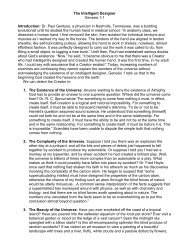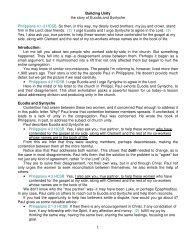Communion of saints
Communion of saints
Communion of saints
You also want an ePaper? Increase the reach of your titles
YUMPU automatically turns print PDFs into web optimized ePapers that Google loves.
THE COMMUNION OF SAINTS<br />
concept <strong>of</strong> the person and the basic social relations that neither<br />
should be somehow abstracted from empirical social structures.<br />
But both must be conceived <strong>of</strong> quite generally, in order to be<br />
applied to the special case <strong>of</strong> empirical relations with basic<br />
social relations. Empirical relations extend across a social<br />
realm, a group <strong>of</strong> social acts, which are not our immediate<br />
concern. We are asking, rather, whether a person must necessarily<br />
be thought <strong>of</strong> in relation to another person, or whether a<br />
person is conceivable in an atomist fashion ; and this leads to the<br />
question <strong>of</strong> what are the basic relations between persons. That is<br />
why in our historical introduction we discussed the philosophical<br />
background <strong>of</strong> each social theory, and not the history <strong>of</strong> the<br />
social theories themselves.<br />
In brief, we are dealing not with the<br />
empirical fact <strong>of</strong> communities <strong>of</strong> will, and the specific sociological<br />
problem <strong>of</strong> the interaction <strong>of</strong> wills, but with basic ontic relations<br />
<strong>of</strong> social existence. Our problem, therefore, is the metaphysic<br />
<strong>of</strong> sociality.<br />
This part <strong>of</strong> our investigation is therefore not sociological, but<br />
theological and philosophical. In this way we hope to find a<br />
norm in these basic matters for empirical sociology. It is the<br />
basic ontic relations which provide the norm for all empirical<br />
social life.<br />
church.<br />
This is <strong>of</strong> the greatest significance for a concept <strong>of</strong> the<br />
In thus presenting basic social relations from the standpoint <strong>of</strong><br />
Christian dogmatics we do not mean that they are religious ;<br />
they<br />
are purely ontic, but seen as such from the Christian perspective.<br />
This provides us with the conditions for a positive presentation <strong>of</strong><br />
the philosophical basis <strong>of</strong> the Christian doctrine <strong>of</strong> persons and<br />
basic relations. We must look for the scheme by which basic<br />
Christian relations are to be understood.<br />
We first ask whether the philosophical schemes are satisfactory.<br />
The metaphysical scheme involves a basic overcoming <strong>of</strong> the<br />
person by absorbing it into the universal. The epistemological<br />
subject-object relation does not advance beyond this, since the<br />
opposition is overcome in the unity <strong>of</strong> mind, in intellectual<br />
intuition, but there is no distinction between the subject-object<br />
and the I-Thou relation; but the latter is absorbed in the<br />
26
















